So, recently you’ve got yourself a pup you’ve wanted for so long – a corgi (read: cuteness overload). Kudos to you!
I think we can all put our hands in agreement that corgis are one of the cutest and fluffiest creatures on earth…Until they start biting you. A lot.
Not only does it hurt, but it can turn into a bad habit if it isn’t dealt with on time. And you certainly don’t want that.
But why do corgis bite in the first place? Are there any particular reasons for such behavior? If there are – how to address them adequately?
It’s a good thing you’re in the right place. Make yourself comfortable and sit through this article, as we’re sure it will be useful.
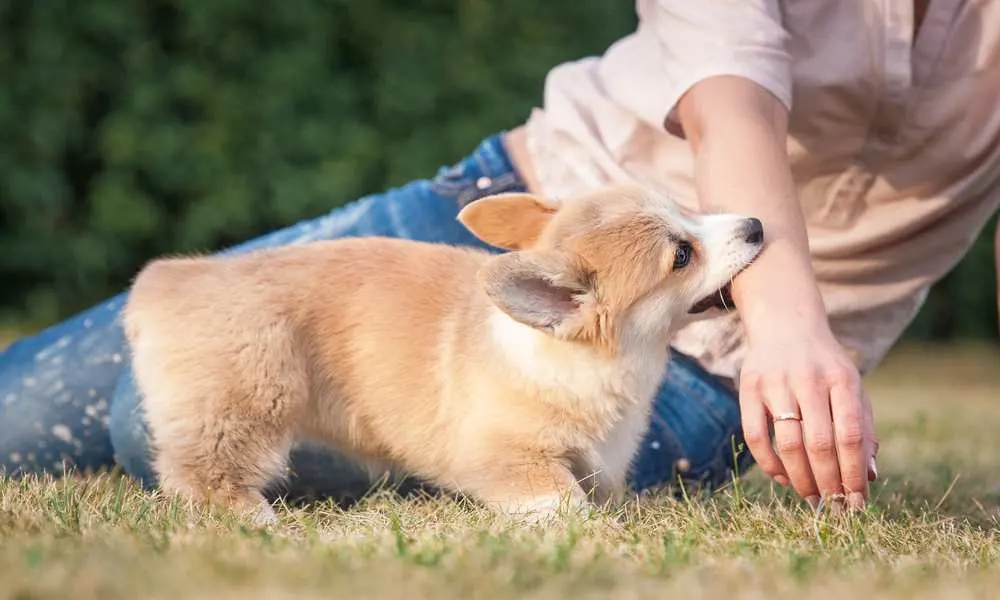
Why Is Your Corgi Biting You?
It’s not a secret every dog goes through a nipping phase while growing up, and it’s completely normal. By eight weeks, puppies develop their 28 razor-sharp milk teeth, which fall out whenever they start chewing on something.
The shift between permanent and baby teeth is called teething. This can be mildly uncomfortable and painful for your pup, as his gums will be sore.
Signs? Well, there’s usually a lot of drooling and maybe some blood spots on your dog’s toys. But don’t worry, it’s supposed to be like that.
During this stage, they will chew on literally anything and anyone.
And although this can be very annoying (and painful for your hands and legs), it doesn’t last forever, so fret not. After six months, your dog will have a new set of 42 permanent teeth.
Of course, if you notice anything unusual or if the pup’s baby teeth don’t fall out after the first six months, make sure to contact your veterinarian.
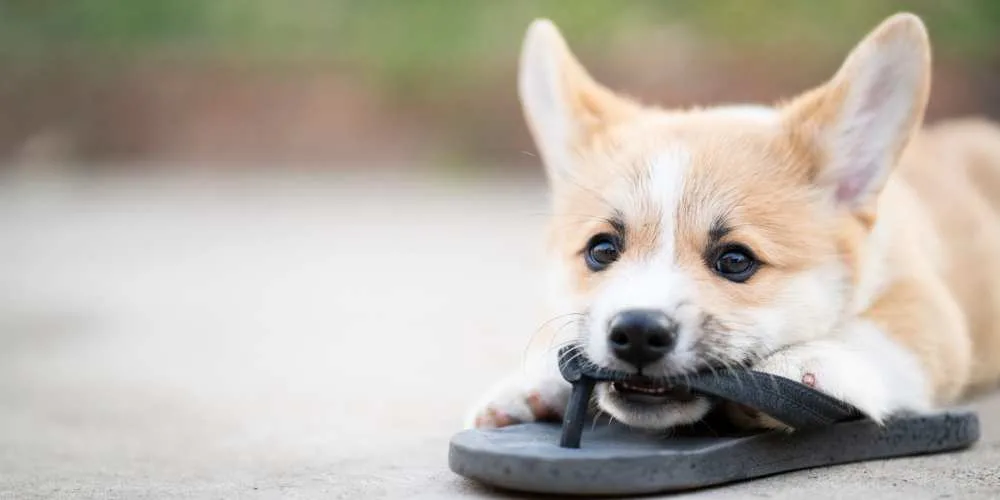
What’s The Difference Between Mouthing, Nipping, and Biting?
Many dog owners seem to use these three terms interchangeably, so let’s see what the main differences are:
Mouthing
Mouthing is when a dog puts his mouth around your hand and gnaws it with barely any teeth involved. It’s usually not painful, and with proper training, it won’t turn into harmful biting in adult dogs.
If you let your dog chew on your fingers more aggressively, he will think this is acceptable behavior. It will also be harder and more confusing to teach him to stop doing it later on.
Nipping
Nipping is a term that usually puppy owners are struggling with. It feels like a sharp pinch and can be quite painful. Nipping is harmless, but it can be the main culprit for painful scratches on the surface of your skin or small holes and tears on your clothes.
Biting
Put simply; it’s when a dog bites down hard with its teeth on something or someone. And oh boy, do corgis bite hard.
Some breeds even shake their prey fast from side to side and pull it towards them. It’s called raging, and some puppies may exhibit this behavior.
It doesn’t necessarily mean your puppy will grow to be aggressive, but you will need to train him.
You see, it’s entirely normal for dogs to bite each other in play, but you’ll have to teach him not to bite other people like that while playing.

Why Do Corgis Bite Ankles?
First, you need to learn some things about corgis’ background.
Back in the day, many dogs were bred to do a specific job, such as securing the farm and property, digging a tunnel for vermin, or herding livestock like corgis.
Since corgis are a short dog that only reaches a maximum of 12,5 inches tall, they needed to be aggressive. Imagine an animal that small and short, herding a vast cattle.
How did they do it?
Simple. Corgis would nip and bite heels of livestock to return them to the flock and then quickly dodge to keep away from hooves.
They also had to chase away predators, and there was usually a lot of barking and biting involved.
Thus, because of their herding background, they can be quite defensive when guarding their territory and even bark at passer-by if not trained appropriately.
Now that we got that covered, back to the central question: Why do corgis bite ankles?
Well, basically, they’re trying to herd you. When corgis bite your ankles or heels, they’re actually imitating the livestock herding behavior for which they were bred in the first place.
All corgi owners should be prepared for this, as this is normal for this breed. It shouldn’t come as a shock; what’s important is to learn how to redirect your corgi’s behavior on time so he doesn’t get used to it as an adult.
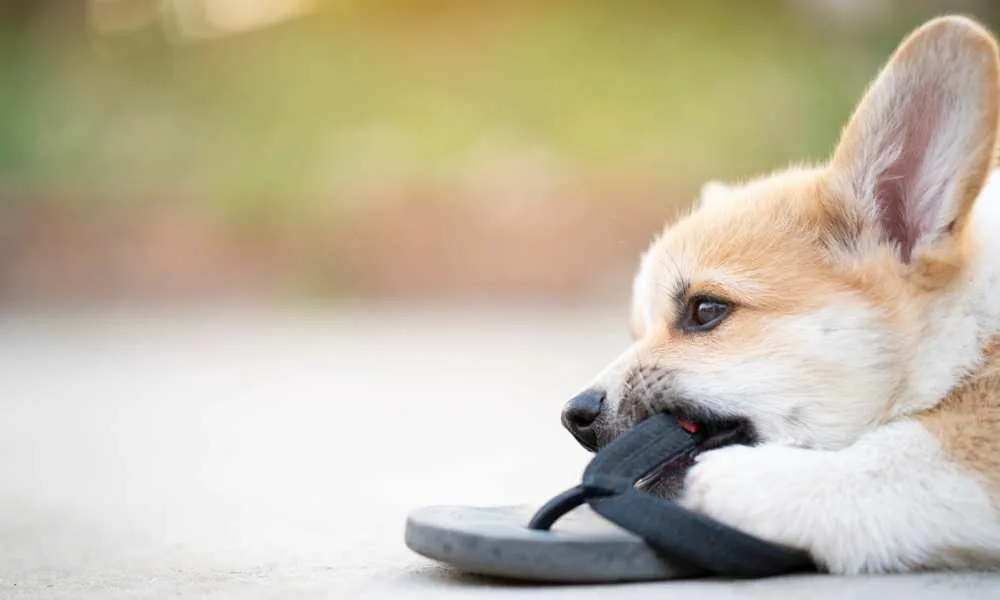
Why Do Corgis Bite So Much?
If you’re a corgi owner, you probably wondered at least once or twice, ‘why does my corgi bite so much’ right?
Let us explain this:
If your corgi bites you while playing and you pull your hand or leg back, you’re actually only reinforcing that behavior.
If you keep pulling your hands or feet back, you will encourage him to keep biting you. The same goes for taking your hand out of his reach and putting it back.
He thinks of it as a game, and he will continue to nip on you. It’s a never-ending circle, and you should know that corgis are, in fact, a very nippy breed.
Moreover, some corgis may even try to manipulate their owners by biting them. That usually happens for several different reasons.
He may bite you because he wants your attention or perhaps because you’re ignoring him or don’t feed him. He is forcing you to respond since he for sure knows you’re going to react when he bites you.
And that’s dog-owner manipulation 101, folks.
Since corgis are extremely smart (they’re one of the top 20 most intelligent dogs!), they will do this often. Not to mention how stubborn they can get.
However, many different techniques can help you train your corgi the right way. We’ll cover that in the next section, so keep on scrolling!
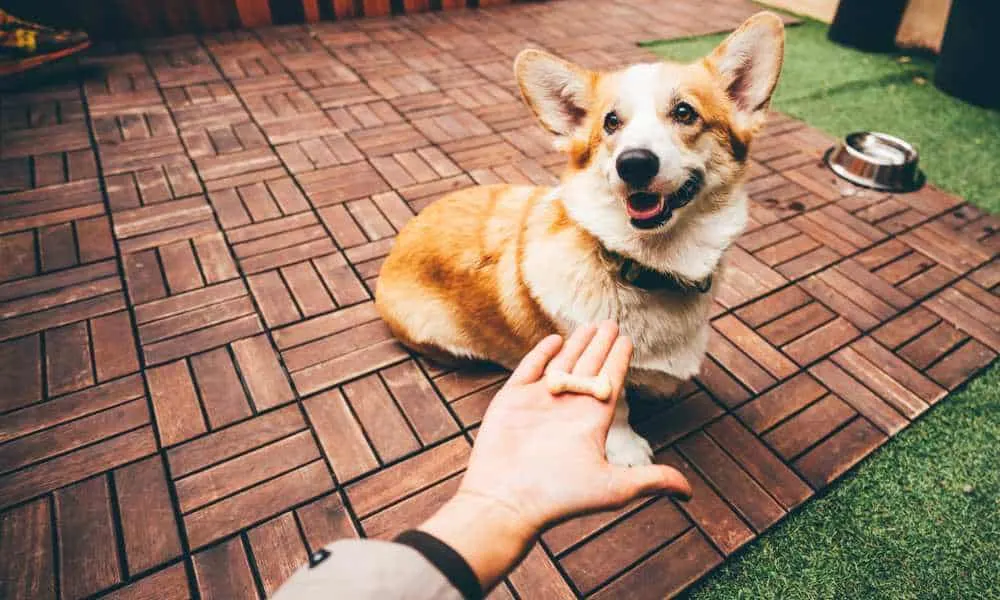
Stop Your Corgi From Nipping On Time
As we’ve already explained, it is normal for corgi puppies to nip and bite their owners. Generally, biting things and people is the way puppies explore and learn the world around them.
But when your corgi’s adult teeth start to grow in, it stops being all fun and games. That’s why it is very important to train your corgi not to bite at an early age.
However, you should be patient with your pup. Don’t expect him to learn everything overnight. Be consistent in your training, and you’ll see the results after a few weeks.
Also, be prepared to set aside an hour or two each day to train your corgi puppy not to bite. If you want to reward some behaviors, you can prepare a few doggy treats.
But make sure to remember one thing:
Don’t use punishment to rebuke the behavior you disapprove of.
Physical punishment will only teach your corgi to be more aggressive. Instead, buy a bunch of different chew toys and try the following methods.
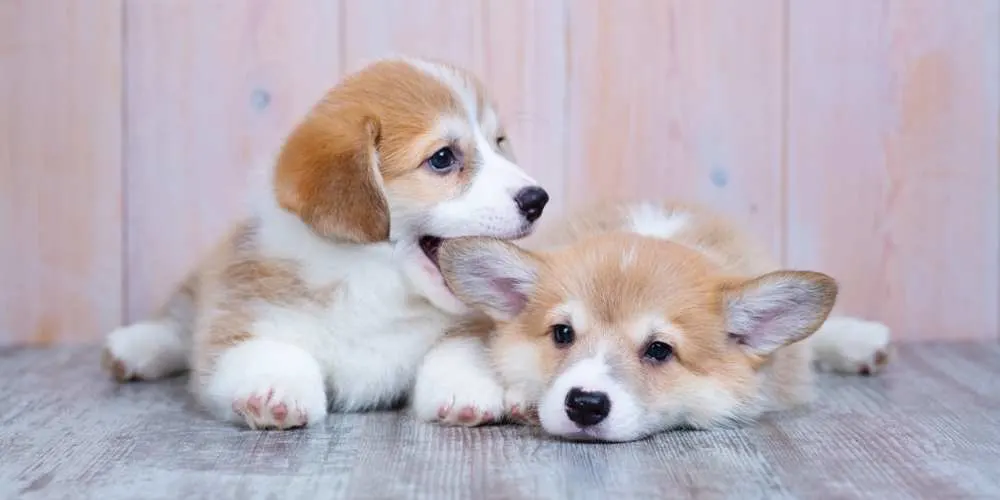
Ignore Your Fur Baby
This is the first technique that you should try while training your corgi. If your corgi puppy is biting and nipping on you hard, the trick is to stop everything you’re doing and ignore him.
Don’t interact with your puppy; let him bite on your fingers, toes, shoes, or whatever it is he’s nipping on. This specifically means that you don’t move or pull back your arms and legs. Don’t hit, yell on him or tell him ‘NO’. Simply ignore your four-legged friend.
Why is this technique good while your corgi is still a puppy?
When your corgi puppy learns that he can’t get attention from you by biting or nipping on you, after a while, he’ll stop doing it. However, this won’t always work.
If he’s trained to get your attention by biting, then it will be a good lesson for him. Otherwise, you may want to try another technique.
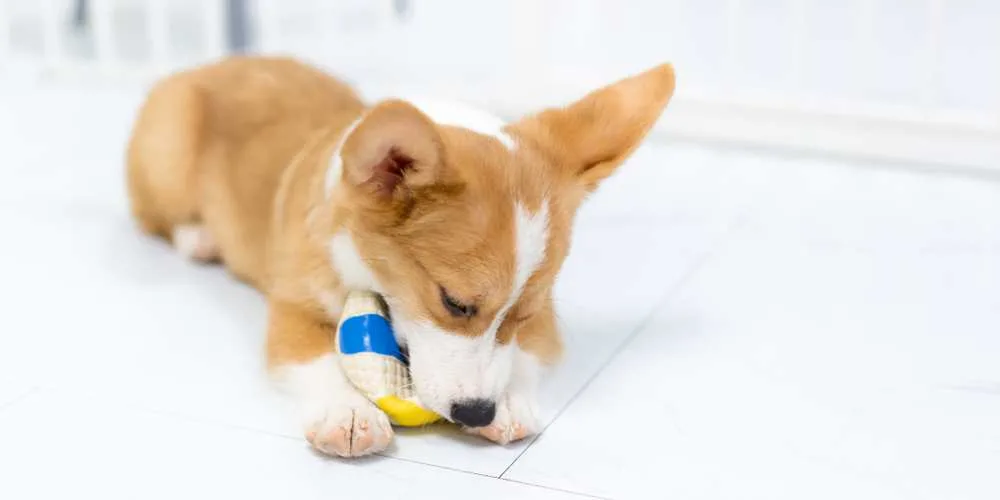
Freeze and Wait
You get a corgi puppy, and the next thing you know, you can’t walk across the room without him nipping on your toes. It can get frustrating at some point.
That’s quite normal for teething puppies, and in his mind, you’re having fun and playing games. In reality, it hurts.
So, as soon as he bites, stop everything you’re doing and freeze in one place. Don’t talk, walk, move or make eye contact with your puppy. You can even try crossing your arms and looking up at the roof.
Try staying in this position for a few moments. Your puppy will most likely start sniffing around you, or he will sit and stare at you.
Whatever you do, don’t look at him. It can be challenging since your puppy will start jumping on you, whining, barking, or doing other things just to get your attention. But wait until he ultimately settles down and stops. Then continue walking or whatever you were doing.
If he starts biting on your toes again, repeat the process. It may take some time until he gets a message, but be persistent.
What’s the lesson here?
Your puppy will learn that biting and nipping on your toes and hands means you’ll ignore him. And that’s something no dog likes, especially not corgis.
What’s important to remember here is to stop doing everything immediately when he bites you. If you’re walking him or preparing his meal, and he bites you, stop and don’t feed him. Eventually, your corgi will learn that biting will get him nowhere.
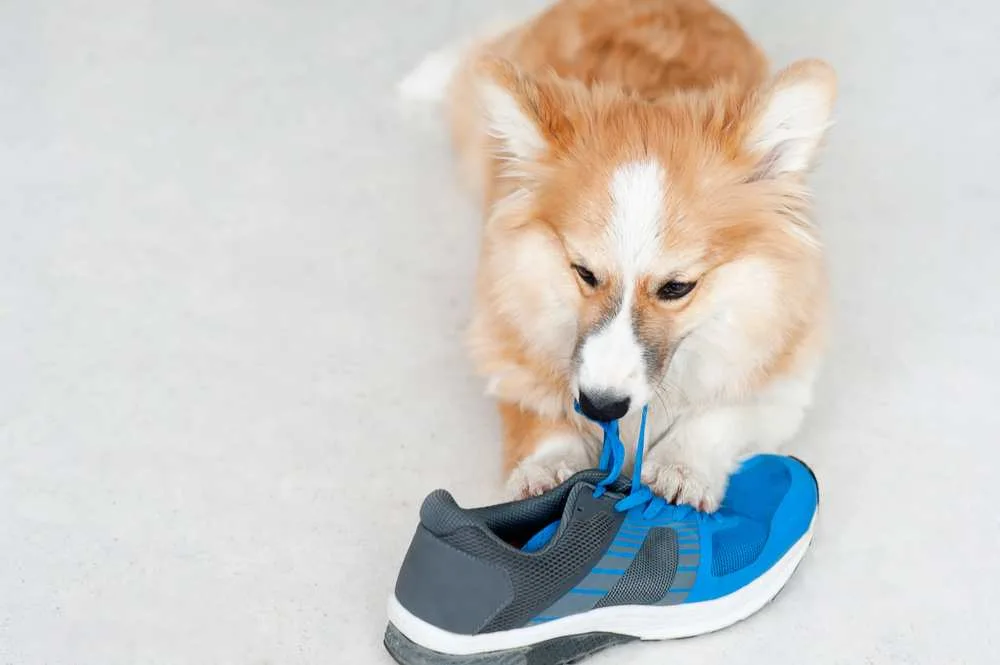
Yelp
Yelping is one of the most popular techniques and has a high success rate.
Here is what you’ll need to do:
- Start playing with your corgi using a toy. Allow him to bite on your fingers as you play.
- As soon as it starts to hurt, yell loudly. A high-pitched sound is best because it mimics the noise other dogs make while fighting.
- Don’t pull your hand out of his mouth; hold still. If you pull it back, it will only reinforce him to bite harder. Your corgi should let go once you yelp or when he notices you’re not moving.
- When your corgi puppy lets go of your hand, or licks you as a sign of an apology, give him a treat.
- Repeat this every day a few times per session.
As for noises or exact phrases, it’s up to you. You can scream, shriek, or say something like ‘Yelp!’, ‘Yikes!’, ‘Stop!’, ‘Aah!’, ‘Eek!’, ‘Ouch!’ or other. Make sure to always use the same one.
Important things to remember:
- Don’t yell in his ears directly as it can scare him or damage his hearing;
- Yell facing upwards;
- Yell as soon as he bites you;
- Don’t yell too loud as it can scare him permanently;
- Use the same phrase every time you yell;
- Don’t punish your corgi after yelling.
After yelping, your corgi will probably back off and stare at you. If he bites again, repeat the process.
However, you don’t want to yelp too early because maybe he is trying to lick you, for example. You don’t want to stop him from good behavior, and you especially don’t want to associate yelping with negative actions.
If he still bites even when you yelp, you may need to change the phrase you’re using and adjust your volume and timing.
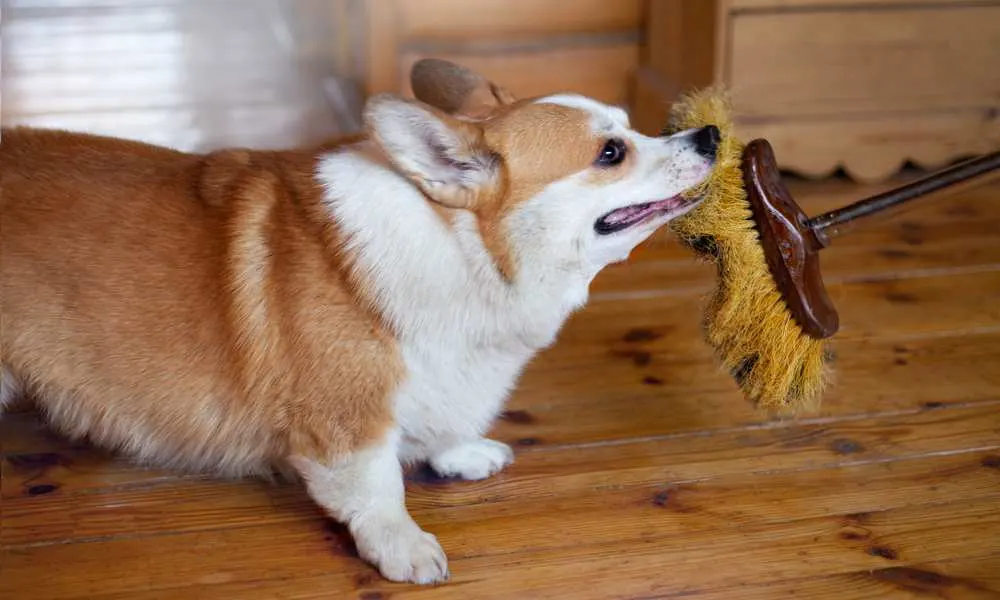
The Replacement Method
This technique will require a chew toy, your dog’s favorite, if possible.
When your corgi starts chewing on you, use a toy to redirect his attention and let him chew on it instead. You’ll do so by positioning the toy in front of his mouth.
Your dog should start chewing on a toy instead of your fingers and toes, and that’s all there is to it. The trick is to repeat it every time he starts nipping on you.
But what if your corgi is not interested in the toy you’re offering? Well, then you’ll have to make the toy as interesting as possible.
Try the following methods:
- Try a variety of different toys to see which one he likes the most; maybe he likes softer toys than harder toys, or perhaps the rope toy is more interesting than the squeaky ones, etc.;
- You can use a toy with a hole or a kong and fill it with some treats;
- Put a little bit of peanut butter (homemade is the best, avoid the ones with Xylitol as it is poisonous for dogs).
You can also give your corgi pup a treat as soon as he stops biting on you and starts chewing the toy. Awarding your dog right after he does something right is the best way for him to learn.

The Time Out Method
If none of the techniques from this list works, the last option is to put your dog in time out. This essentially means you’ll have to put your dog in his pen.
Note that it will probably be a lot of whining, crying, and barking, but be persistent.
Wait for your dog to settle down, and then immediately release him. If your corgi can’t seem to stop biting, repeat the process; just don’t overdo it.

Poke Him In Mouth
This is another trick that you can try if your corgi’s biting seems out of control.
Let’s say your puppy bites you on your fingers. What you can do is curl your finger into the side or top of his mouth and gently poke it with your nail.
You also don’t want to do it too hard to hurt your dog, but just enough to make him stop biting you.
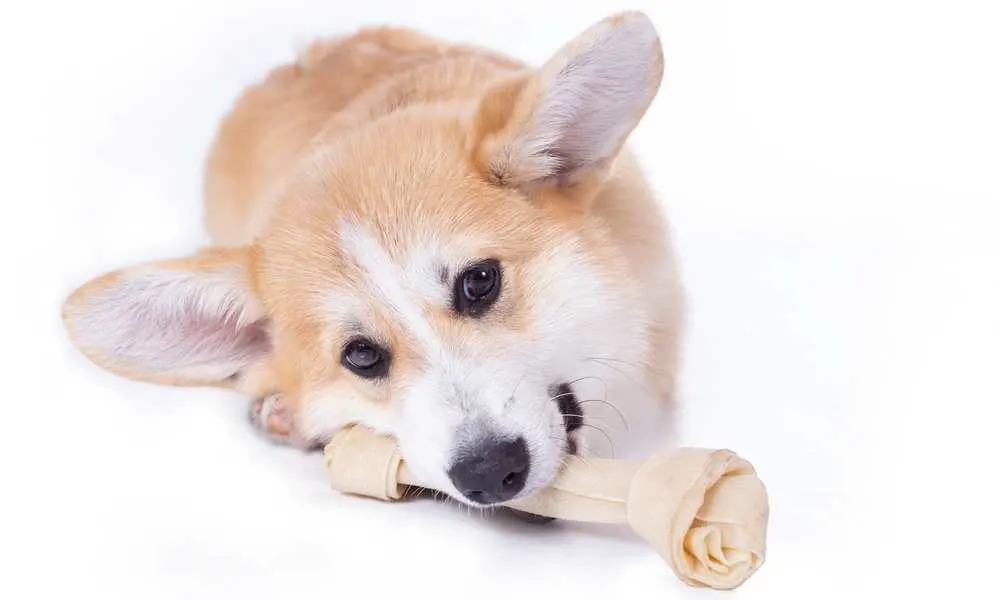
Consult A Professional Dog Trainer
If you’ve already tried everything else, it’s not a shame to seek professional help. There are different group puppy training classes, or you can hire an individual to help you.
Poorly trained corgis or the ones that are adopted can sometimes be much challenging to train alone. Some may even express aggression problems for various reasons.
Remember that every corgi is different, and its personality will depend on multiple things like genes and the environment it grew up.

The Last Say
All in all, biting and nipping are more common in corgi puppies than in adults. After all, if an adult corgi starts biting or you notice something strange in his behavior, we advise you to contact your veterinarian or a professional dog trainer for help.
Nevertheless, you can try a plethora of techniques with your corgi pup to teach him to stop biting you.
One thing is for sure – he needs to learn not to bite and nip on you or the people around you while he’s still a puppy. If you wait until he’s all grown up, it might be confusing and more difficult for him to learn.
In the end, whatever you do, be patient and continue with the training. The teething phase won’t last forever, and in the meantime, you should try and redirect your corgi pup to chew on its toy rather than your feet.

